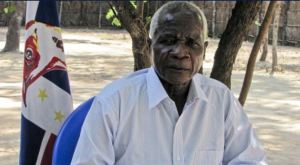nsnbc : Alfonso Dhlakama, the president of the Mozambican party Renamo and its illegal armed wing, has again complained that the government is too slow at withdrawing troops from positions around the Gorongosa mountain range, in the central province of Sofala.
In an interview published in Friday’s issue of the weekly “Savana”, Alfonso Dhlakama said that he and President Filipe Nyusi had first discussed the withdrawal in April. He claimed that “so far nobody has left”.
The Renamo leader admitted that government forces had abandoned positions at Mapanga-panga, Siua and Mazembe, but claimed they had only pulled back “five or ten kilometers in the same area”. Dhlakama himself is living in a Renamo military base in Gorongosa – His so-called “bush headquarter” where he allegedly has to hide because the government and military are “out to kill him”, as he repeatedly claimed.
Dhlakama moved to the “bush headquarter” after he and Renamo’s leadership, in 2012, decided to recall former Renamo militants and to recruit new ones. The move coincided with the discovery of major untapped natural gas resources and Dhlakama’s demand that he / Renamo wanted a fair share in revenues.
The deadline for the withdrawal of military forces under the latest agreement is 30 June. “I can believe that perhaps by the 30th they will leave, but it’s going slowly”, said Dhlakama. He said he hoped that, in the coming week, “things can go a bit faster, both in decentralization and in military matters”. These are the two subjects being dealt with by working groups set up between the government and Renamo. These groups have avoided contact with the media, making it difficult for the public to know what they have discussed.
Dhlakama claimed the truce he declared, which has been in force since 27 December, has been “a great success”. He confirmed that there have been no clashes between Renamo gunmen and government forces, but complained of “lack of discipline” among the armed forces (FADM). “They drink while in uniform”, he accused, “they ask for money, and sometimes they steal property”. Such incidents had happened in Zambezia and Manica provinces, he said, while in Tete police had refused to allow Renamo branches to hoist the Renamo flag.
In the latter case, Renamo parliamentary deputies had gone to speak with the provincial police commander. “These are the little things that are happening”, said Dhlakama, “perhaps because, for anyone who knows the Frelimo army, they have no discipline”.
The Renamo leader told “Savana” he wants a decentralization package agreed by the Mozambican parliament, the Assembly of the Republic, by the end of this year. There is already general agreement among the three political parties represented in the Assembly – Frelimo, Renamo and the MDM (Mozambique Democratic Movement) – that provincial governors should be elected rather than appointed by the President. This would require a constitutional amendment, which needs a two thirds majority in the Assembly, which can only be achieved by an agreement between Frelimo and Renamo.
Far more problematic is Dhalakama’s demand that members of the illegal Renamo militia be appointed to senior positions in the FADM. The FADM was initially set up in 1994 by a merger of volunteers from the old government army, the FAM/FPLM and from Renamo. As a result, there have always been Renamo figures in the FADM hierarchy: in particular, from 1994 to the present the Deputy Chief of Staff of the FADM has always been a Renamo officer.
However, sut since the 1997 law on military service the FADM has grown on a basis of conscription, and recruits have not been vetted politically. A return to the appointment of military commanders on a political basis will be extremely difficult, and arguably unconstitutional. Moreover, the Frelimo government previously stressed that Renamo never made use of contributing its share of 15,000 troops to the military, and that “officers” were appointed on the basis of qualifications and merit, and not on the basis of party affiliation.
Nonetheless Dhlakama was optimistic that a definitive peace will be agreed in the near future. He said there is pressure on both the government and Renamo to recover Mozambique’s good image and attain “justice, economic development and effective peace”. He added that he wanted to send “a message of peace. We want real peace and not just the silencing of the guns”.
Dhlakama repeated the traditional Renamo claims that there have never been democratic elections in Mozambique, and that Frelimo and its three presidential candidates (Joaquim Chissano, Armando Guebuza and Filipe Nyusi) never won elections. In fact, all election observation missions, both Mozambican and foreign, have upheld the results of successive elections, despite their criticisms of the performance of the Mozambican electoral bodies.
F/AK – nsnbc 18.06.2017
Source Article from https://nsnbc.me/2017/06/18/dhlakama-complains-mozambican-government-too-slow-at-withdrawing-troops/
 RSS Feed
RSS Feed















 June 18th, 2017
June 18th, 2017  Awake Goy
Awake Goy 











 Posted in
Posted in  Tags:
Tags: 













